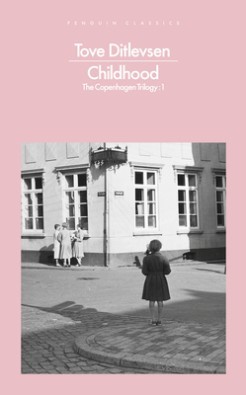In the morning there was hope. It sat like a fleeting gleam of light in my mother's smooth black hair that I never dared touch; it lay on my tongue with the sugar and the lukewarm oatmeal I was slowly eating while I looked at my mother's slender, folded hands that lay motionless on the newspaper, on top of the reports of Spanish flu and the Treaty of Versailles. My father had left for work and my brother was in school. So my mother was alone, even though I was there, and if I was absolutely still and didn't say a word, the remote calm in her inscrutable heart would last until the morning had grown old and she had to go out to do the shopping in Istedgade like ordinary housewives.
The sun broke over the gypsy wagon, as if it came from inside it, and Scabie Hans came out with bare chest and a wash basin in his hands. When he had poured the water over himself, he put out his hand for a towel and Pretty Lili. gave it to him. They didn't say a word to each other; they were like pictures in a book when you quickly turn the pages. Like my mother, they would change in a few hours. Scabie Hans was a Salvation Army soldier and Pretty Lili was his sweetheart. In the summer, they packed a bunch of little children into the green wagon and drove into the country with them. Parents paid one krone a day for this. I had gone myself when I was three years old and my brother was seven. Now I was five and the only thing I could remember from the trip was that Pretty Lili once set me out of the wagon, down in the warm sand in what I thought was a desert. Then the green wagon drove away from me and got smaller and smaller and inside of it sat my brother and I was never going to see him or my mother again. When the children came back home, they all had scabies. That's how Scabie Hans got his name. But Pretty Lili was not pretty. My mother was, though, on those strange and happy mornings when I would leave her completely in peace. Beautiful, untouchable, lonely, and full of secret thoughts I would never know. Behind her on the flowered wallpaper, the tatters pasted together by my father with brown tape, hung a picture of a woman staring out the window. On the floor behind her was a cradle with a little child. Below the picture it said, 'Woman awaiting her husband home from the sea'. Sometimes my mother would suddenly catch sight of me and follow my glance up to the picture I found so tender and sad. But my mother burst out laughing and it sounded like dozens of paper bags filled with air exploding all at once. My heart pounded with anguish and sorrow because the silence in the world was now broken, but I laughed with her because my mother expected me to, and because I was seized by the same cruel mirth as she was. She shoved the chair aside, got up and stood in front of the picture in her wrinkled nightgown, her hands on her hips. Then, with a clear and defiant little-girl voice that didn't belong to her in the same way as her voice did later in the day when she'd start haggling about prices with the shopkeepers, she sang:
Can't I sing
Whatever I wish for my Tulle?
Visselulle, visselulle, visselulle.
Go away from the window, my friend,
Come back another time.
Frost and cold have brought
The old beggar home again.
